For the 2025 school year, there are 2 public elementary schools serving 1,369 students in Little Egg Harbor Township School District. This district's average elementary testing ranking is 3/10, which is in the bottom 50% of public elementary schools in New Jersey.
Public Elementary Schools in Little Egg Harbor Township School District have an average math proficiency score of 23% (versus the New Jersey public elementary school average of 37%), and reading proficiency score of 32% (versus the 49% statewide average).
Minority enrollment is 21% of the student body (majority Hispanic), which is less than the New Jersey public elementary school average of 63% (majority Hispanic).
Overview
This School District
This State (NJ)
# Schools
3 Schools
1,930 Schools
# Students
1,675 Students
886,629 Students
# Teachers
162 Teachers
77,858 Teachers
Student : Teacher Ratio
10:1
10:1
District Rank
Little Egg Harbor Township School District, which is ranked within the bottom 50% of all 646 school districts in New Jersey (based off of combined math and reading proficiency testing data) for the 2021-2022 school year.
Overall District Rank
#516 out of 650 school districts
(Bottom 50%)
(Bottom 50%)
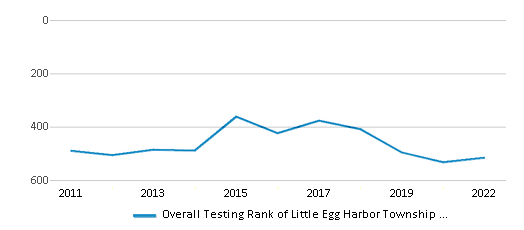
Math Test Scores (% Proficient)
23%
36%
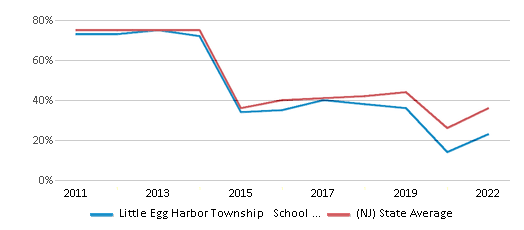
Reading/Language Arts Test Scores (% Proficient)
32%
49%
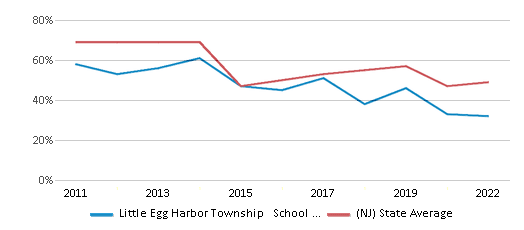
Science Test Scores (% Proficient)
14%
23%
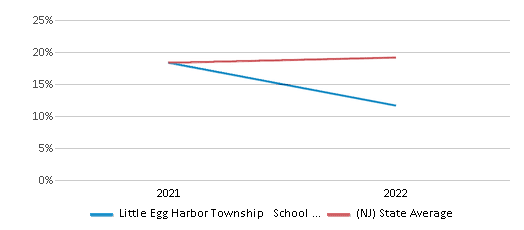
Students by Ethnicity:
Diversity Score
0.36
0.72
# American Indian Students
4 Students
1,992 Students
% American Indian Students
n/a
n/a
# Asian Students
17 Students
92,318 Students
% Asian Students
1%
10%
# Hispanic Students
185 Students
301,752 Students
% Hispanic Students
11%
34%
# Black Students
71 Students
132,335 Students
% Black Students
4%
15%
# White Students
1,332 Students
325,482 Students
% White Students
80%
37%
# Hawaiian Students
4 Students
1,690 Students
% Hawaiian Students
n/a
n/a
# Two or more races Students
62 Students
30,907 Students
% of Two or more races Students
4%
4%
Students by Grade:
# Students in PK Grade:
306
41,362
# Students in K Grade:
213
85,425
# Students in 1st Grade:
171
93,943
# Students in 2nd Grade:
198
96,713
# Students in 3rd Grade:
222
95,865
# Students in 4th Grade:
184
97,373
# Students in 5th Grade:
183
98,202
# Students in 6th Grade:
198
99,575
# Students in 7th Grade:
-
80,278
# Students in 8th Grade:
-
80,823
# Students in 9th Grade:
-
4,713
# Students in 10th Grade:
-
4,047
# Students in 11th Grade:
-
3,770
# Students in 12th Grade:
-
4,350
# Ungraded Students:
-
190
District Revenue and Spending
The revenue/student of $24,118 in this school district is less than the state median of $26,931. The school district revenue/student has stayed relatively flat over four school years.
The school district's spending/student of $22,383 is less than the state median of $25,828. The school district spending/student has stayed relatively flat over four school years.
Total Revenue
$40 MM
$36,642 MM
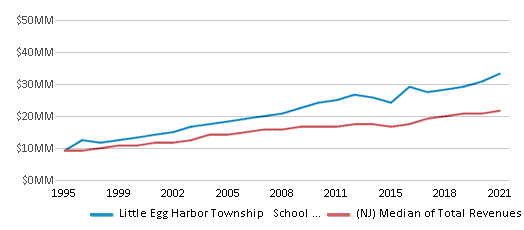
Spending
$38 MM
$35,142 MM
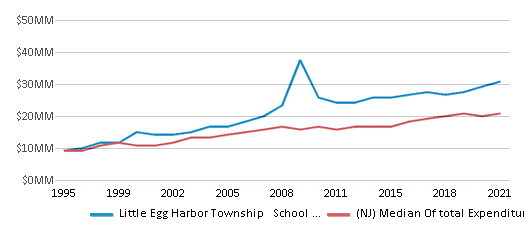
Revenue / Student
$24,118
$26,931
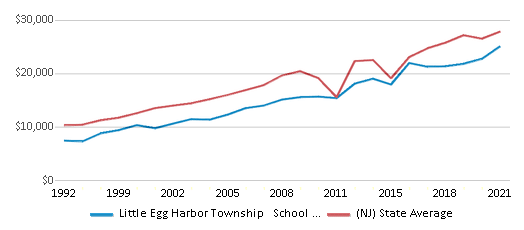
Spending / Student
$22,383
$25,828
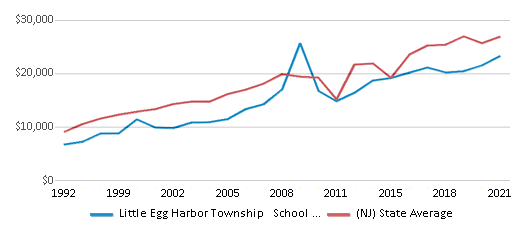
Best Little Egg Harbor Township School District Public Elementary Schools (2025)
School
(Math and Reading Proficiency)
(Math and Reading Proficiency)
Location
Grades
Students
Rank: #11.
George J. Mitchell Elementary School
(Math: 40-44% | Reading: 35-39% )
Rank:
Rank:
3/
Bottom 50%10
950 Route 539
Tuckerton, NJ 08087
(609) 296-7131
Tuckerton, NJ 08087
(609) 296-7131
Grades: K-2
| 582 students
Rank: #22.
Frog Pond Elementary School
(Math: 23% | Reading: 32%)
Rank:
Rank:
3/
Bottom 50%10
305 Frog Pond Road
Tuckerton, NJ 08087
(609) 296-1719
Tuckerton, NJ 08087
(609) 296-1719
Grades: 3-6
| 787 students
Recent Articles

Year-Round Or Traditional Schedule?
Which is more appropriate for your child? A year-round attendance schedule or traditional schedule? We look at the pros and cons.

Why You Should Encourage Your Child to Join a Sports Team
Participating in team sports has a great many benefits for children, there is no doubt. In this article you will learn what those benefits are.

White Students are Now the Minority in U.S. Public Schools
Increasing birth rates among immigrant families from Asia and Central and South America, combined with lower birth rates among white families, means that for the first time in history, public school students in the United States are majority-minority. This shift in demographics poses difficulties for schools as they work to accommodate children of varying language abilities and socio-economic backgrounds.





